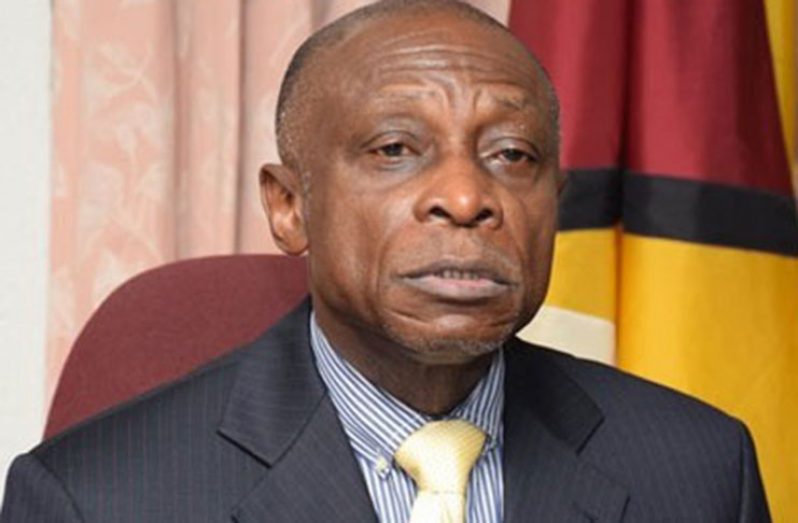THE Nicolas Maduro Venezuelan government and the opposition earlier this week signed an agreement confirming their “unanimous position in claiming rights over the Essequibo”- a position which this administration has strongly repudiated, even at a time when the United Nations is seeking a permanent solution to the decades-old controversy. The agreement was part of a five-point pact between the two factions that was brokered by the Vatican. According to the agreement, both political factions confirmed their “unanimous position in defence of the legitimate and inalienable rights of Venezuela over the Essequibo” in the country’s territorial dispute with neighbouring Guyana, and released an official joint-declaration entitled “Living Together in Peace.”
A Monitoring Commission led by former Spanish president and chief mediator in the talks, José Luis Rodríguez Zapatero, is to be set-up to ensure that the pledges are carried out.
Meanwhile, Cabinet has approved the attendance of Vice-President and Minister of Foreign Affairs, Carl Greenidge, at meetings which are upcoming with the incoming Secretary-General of the United Nations António Guterres on November 18 and 19. He will lead a delegation to those meetings. Guyana had approached the Secretary-General of the United Nations to act in accordance with his obligations under the Geneva Agreement to choose another means of settlement of the border controversy between Venezuela and Guyana in accordance with Article 33 of the United Nations Charter. The Secretary- General had agreed to recommend a way forward for the final resolution of the controversy before he demits Office in November, 2016. The meeting between Greenidge and the incoming Secretary-General will be part of the process to secure that recommendation. The Director-General of the Ministry of Foreign Affairs, Audrey Waddell, will accompany the minister to the meetings.
No bullysim
Earlier this week, Prime Minister Moses Nagamootoo told an international conference of chief justices in India that any challenge to the 1899 Arbitral Award that settled the border dispute between Guyana and Venezuela must be settled by juridical means and not by military intervention, threats and bullyism. He said Guyana, a country with an area of 83,000 square miles faces many challenges, but the greatest of them is the threat to the security of its territory from Venezuela. Venezuela is claiming five-eights of Guyana. “We firmly believe that our borders have been defined and settled under [a] Treaty that goes back to 1899, and any challenge to it must be settled by juridical means, not by military intervention, threats and bullyism,” the Prime Minister said. He said for this reason, binding judicial decisions are needed, in addition to strict enforcement of international law to curb aggression.
The Prime Minister delivered his address in the presence of Founder and Convenor of the International Conference of Chief Justices of the World, Dr. Jagdish Gandhi. Chancellor of the Judiciary of Guyana, Justice Carl Singh; Prime Minister of Mauritius, Sir Anerood Jugnauth and Lady Jugnauth; former Presidents of the Republics of South Africa, Mauritius, Croatia and Sudan were among the officials present.
President David Granger had used his United Nations address back in September to call on Secretary- General Ban Ki-moon to “free” Guyana from the territorial sovereignty challenge posed by Venezuela. During his address at the opening of debates at the 71st Session of the United Nations (UN) General Assembly in New York, President Granger had said Guyana’s climate change and economic efforts are being severely hampered by Venezuela’s threats to its territorial sovereignty.
Guyana’s territorial integrity has, for 50 years, been violated by Venezuela, and Venezuela has issued a number of decrees claiming territory in Guyana. The UN Secretary-General is expected to demit office in December, and President Granger has expressed much optimism that his country’s request for a juridical settlement of the border controversy will materialise. Guyana has maintained that the juridical route is the only solution to the ongoing border controversy with Venezuela. Venezuela, on the other hand, has called for a restart of the Good Officer process.
President Granger said that Guyana’s advances in the area of climate change would be of no use if Venezuela remains a threat to Guyana’s territorial integrity. “Guyana is part of this global ‘green’ movement: its natural assets, commitment to sustainable development, contribution to countering the adverse effects of climate change, and collaboration with the international community in seeking solutions to global threats have distinguished it as an emergent ‘green’ State.”
But notwithstanding this progress, the country is constrained, and according to President Granger, all of the country’s efforts—whether nationally, regionally or globally -– aimed at advancement in a peaceful and stable environment are being challenged by the “territorial ambitions” of Venezuela. “I place hope in the fact that the process for a final resolution of Venezuela’s unworthy territorial claims rests now in the hands of the Secretary-General of the United Nations,” he said.
He also said that Venezuela has, for a full year since he last spoke at the UN, stalled Guyana’s progress by every means at its disposal and has intensified its aggression against Guyana and thwarted all of the Secretary-General’s efforts to pursue ‘a way forward’ – at least in terms of a process that promises final resolution to the controversy. The President noted that Guyana stands ready to have the International Court of Justice (ICJ) bring finality to the matter. Guyana, he said, will continue to work resolutely with Secretary-General Ban Ki-moon during his final months in office and thereafter with his successor, to “free Guyana from this surreal burden.”
Greenidge for talks with incoming UN chief …as Maduro, opposition unite to claim Essequibo
SHARE THIS ARTICLE :
Facebook
Twitter
WhatsApp



.jpg)









